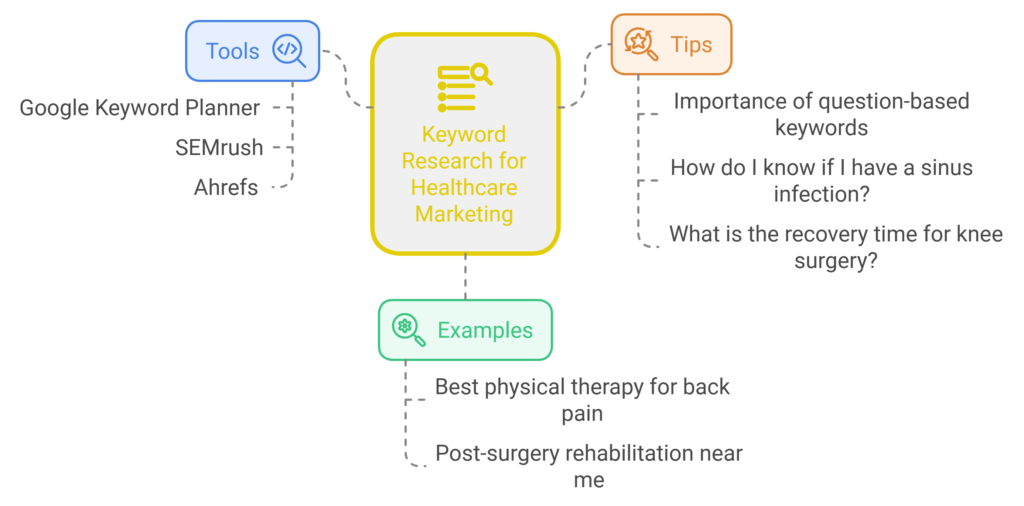Listen to the audio :
In today’s digital age, promoting business in the healthcare industry requires more than just a few healthy plans.It requires a well-planned SEO strategy as well. As for a healthcare marketing agency, keyword research is an essential component of the strategies employed to reach the patient at the most critical time. More and more people, from looking for treatment options to the services of specific practitioners, have turned to the web in search of information regarding their health issues. In order for your agency to tap into this market effectively, it is paramount to discover phrases that they speak concerning health, and those phrases that will help in increasing awareness and aids. In this article, we will look at how keyword research is focused on health services and how it can benefit your healthcare marketing agency by converting searches into patients.
Keyword Research Tailored for Health Services
When it comes to marketing for health services, keyword research isn’t just another step—it’s the heart of your SEO strategy. In the healthcare industry, people search for everything from common cold symptoms to complex treatment options. So, if you want your healthcare marketing agency to stand out, you need to use keywords that speak directly to your audience’s concerns and needs. Let’s dive into how you can get it right!

Understanding Patient Search Behavior
But, even before you jump into the process of selecting the ideal keywords, it would still be best to place yourself in the shoes of a patient. There is a difference when people look for health information on the internet as compared to looking for say a new smartphone or pizza – the latter is more likely to be stress free. In most cases, they tend to be careful at such times, and even anxious, seeking for fairly precise and dependable information. For instance, many can be found typing, “What Does a Cardiologist Do?” Or “How to relieve knee pain at home?” These are quite common and easy to answer, however, most people use these questions when looking for specific answers on treatments, symptoms or even doctors.
In order to do this, begin by considering long-tail keywords. These are the phrases that are very specific and more detailed, which people search for when on a very specific quest. Instead of trying to optimize organs such as the word ‘doctor,’ it will be advisable to optimize on phrases such as ‘highly rated pediatrician for allergies in my locality’ or ‘low cost dental implants for aged individuals.’ In doing so, not only will you be increasing the volumes of more relevant traffic, but also patients who are further down the funnel.
For a healthcare online marketing business such a change of mindset can prove to be very effective. You have to think deeper than just the basic keywords and patient’s demographics in your field. It does not matter the type of institution you run; hospital, clinic or a spa, knowing how patients look for medical services is what will help you reach the right people.
Using Tools to Identify Health-Specific Keywords
There’s no reason to be concerned if you want answers on how to find these golden keywords, it is quite easy! Various keyword-searching tools can serve your needs. A few good ones include Google Keyword Planner, SEMrush, and Ahrefs. These will allow you to find out the frequency of search of various terminologies or phrases about health and wellness and thus understand what the audience is searching for.
Suppose you are associated with a healthcare marketing company that offers services in physical therapy. In that case, you may find search queries such as “best physical therapy for back pain” or “post-surgery rehabilitation near me” commonly searched for by users. Such keywords are the types you wish to optimize for as they are specific, pertinent, and show patient intent.
Also, here’s a pro tip: distaste for question-based keywords will only hurt your content. People often write out full questions in search engines, especially when searching for something health-related, let’s say, “how do I know if I have a sinus infection?” or “what is the recovery time for knee surgery?” These are the exact words inviting to create content with an answer to that question which will establish your healthcare website as an authority answering questions.

Focusing on Intent and User Experience
It’s not just about finding keywords—it’s about understanding why people are searching for them. That’s where user intent comes in. You need to figure out what your target audience is hoping to achieve when they search for specific health terms. Are they looking for information, trying to book an appointment, or researching treatment options?
For example, a search like “symptoms of diabetes” is probably an informational search, while “book a diabetes specialist appointment” shows clear intent to take action. Understanding this difference allows you to optimize your content accordingly. Informational searches are a great chance to create blog posts, FAQs, and educational content. On the other hand, action-driven searches might benefit from landing pages designed to convert visitors into patients, complete with easy-to-use appointment booking forms.
For healthcare marketing agencies, keeping user intent in mind when choosing keywords can improve the patient experience and increase conversions. If you give people exactly what they’re looking for—whether it’s information or an easy way to schedule an appointment—you’re likely to see more engagement and better results.
Keep It Ethical and Trustworthy
When it comes to healthcare, trust is essential. It is not only answers that patients seek but also accurate and credible information from reliable sources. It is for this reason that the use of keywords should be done correctly and devoid of any form of clickbait or gimmicky titles. The keywords that you intend to work with should be aimed at earning the confidence of the target audience rather than drawing in traffic.
To do this, make sure your content is authoritative and well-researched. It’s not enough to rank high on search engines—you need to back it up with credible information that helps patients feel confident in their next steps. Healthcare marketing agencies can help clients position themselves as trusted experts by optimizing for keywords while ensuring the content reflects genuine expertise and care.
Keyword research for health services isn’t just about ranking high—it’s about reaching the right patients with the right message. By focusing on patient search behavior, using the right tools, and optimizing for local SEO, your healthcare marketing agency can attract more relevant traffic and build trust with your audience. Keep user intent in mind, and always prioritize accuracy and reliability, so you’re not only visible but valuable in the healthcare space.
Optimizing Your Health and Wellness Website for Speed
In this hyper-connected era, where everything moves at a much faster pace, the speed of a website has become more critical than ever, particularly in the health and wellness sector. Picture, for instance, that someone is looking actively looking for health-related information that is of utmost importance, say within a period of a few minutes, or trying hard to find a practitioner within that time frame, and, there are slow loading pages to deal with. It is quite annoying, yes? Research has revealed that keen users will most likely leave a site after waiting for three seconds. And for a healthcare marketing agency, that can mean lost patients and business, a low search engine rank, and perhaps worse, advertising waste. But fret not! There are simple techniques that can help you optimize the speed of your health and wellness website. Remember, it’s a process and so there is no need to rush.
Why Speed Matters for Health and Wellness Websites
Centering on care, trust, and efficiency is the essence of the health and wellness industry. If the website is poorly rated so much so that it is very slow, it does no good to the site visitors. In fact, it may even lower the level and quality of services a patient believes the facility offers. Regardless if you are a healthcare marketing agency or a wellness center, speed is of the essence. When patients have health complications, they seek solutions. For this reason, they expect a quick response but if the time taken to load the page is long, the patient may view the business as unprofessional or unreliable.
Search engines such as Google have implied web page load speed as one of the factors used to calculate the rank of the web page. In relation to that, the faster the web page loads, the better it appears on search rankings. This becomes very critical in the health and wellness industry which faces stiff competition both from the local facilities and the big national hospitals that offer the same services to the same patients. Here, enhancing your website speed is not only improving the user experience but also helps your SEO positively.
Compress and Optimize Your Images
Overly big and high-res images are one of the primary factors that contribute to making a website slow. In health and wellness, for instance, it is important to include architecture photos of different features such as staff or services, but too much of these images will cause a bottleneck. This is where image optimization comes in.
When quality does not have to be sacrificed, you can reduce the size of your images to Speed Up Your Website. ‘TinyPNG’ or ‘ImageOptim’ are tools that allow compression of images so that they are easy to render. You may also look into addressing next-gen formats such as WebP, which are smaller than conventional JPEGs or PNGs.
If you’re running a healthcare marketing agency, this is an easy win. Teach your clients how to optimize their images, or offer image compression as part of your web development services. It’s a quick fix that can shave seconds off load times and drastically improve user experience.
Minimize HTTP Requests
Another factor that slows down websites is the number of HTTP requests your site makes. Every time someone visits a page on your website, their browser has to request all the files (like images, stylesheets, and scripts) that make up that page. The more requests, the longer it takes for your website to load.
You can minimize HTTP requests by reducing the number of elements on each page. This might mean combining CSS and JavaScript files, using fewer plugins, or even simplifying your design. A minimalist approach isn’t just aesthetically pleasing also you’d be surprised how a cleaner, less cluttered website can speed things up.
For healthcare marketing agencies, this is an important step in building high-performance websites for clients. When developing or redesigning a health and wellness website, make sure to streamline the number of resources loaded on each page. The fewer HTTP requests, the faster your site will run!
Keyword research in healthcare marketing goes beyond just picking high-ranking words—it’s about understanding patient needs, intent, and providing solutions at every stage of their healthcare journey. By focusing on long-tail keywords, user intent, and ensuring your website delivers a seamless experience, your healthcare marketing agency can drive more relevant traffic while building trust and authority. Remember, the ultimate goal is not just higher rankings, but creating meaningful connections with potential patients who are actively searching for answers and care. Prioritize accuracy, optimize for speed, and deliver quality content, and you’ll see your SEO efforts pay off with more conversions and greater patient satisfaction.
To get these services, you can learn more about our SEO services.

